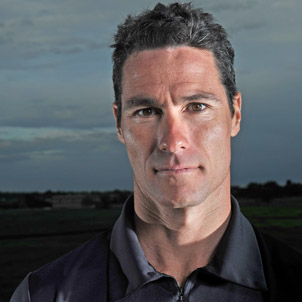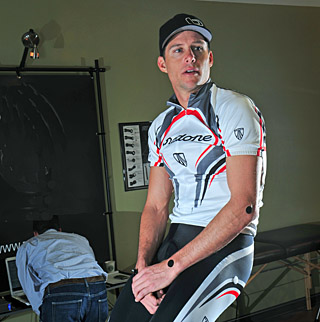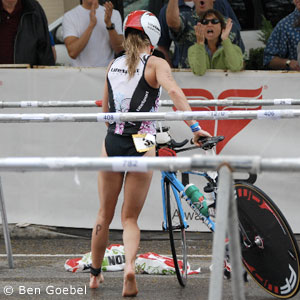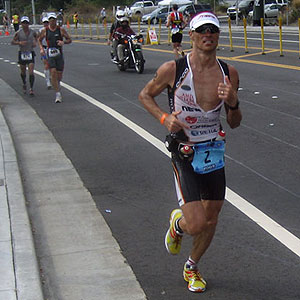The Alexander – Lieto Duel

Every couple of years, triathlon is gifted with a classic duel that pits men of surpassing talent and radically different strengths who bring the last pure measure of their devotion to excellence right to the line.
Last Saturday at the Boise Ironman 70.3, under dramatic dark clouds, wind, rain and even some hail, defending Ironman World Champion Craig Alexander and three-time Ironman winner Chris Lieto were coming off a duel at the Honu Ironman 70.3 in Hawaii. That day, surpassingly excellent cyclist Chris Lieto carved out a 7 minute 42 second lead on the Queen K bike, and Alexander dug in and passed his rival at the 11th mile. In Boise, Lieto saw tougher hills, rain and cooler temps, would give him a better chance. He carved out a lesser 5:30 lead on the bike, but had a lot more let in the tank for the run.
At the end of a high adrenaline, deeply emotional race, both competitors collapsed in a heap just past the line, piled one against the other in a brotherhood of ultimate exertion.
Here is a look at what was going on inside the heads of the duelists.
WHY THIS RACE
CRAIG ALEXANDER: It wasn't ideal timing for this race. But I wanted to race that weekend and launch into a solid block of training at altitude for 5-6 weeks. So it seemed best if I could knock one off in June. A few other things went into my decision. When they announced the race in 2007, they invited me to do some public relations. The race venue had a nice feel with a downtown finish similar to the Pearl Street Mall in Boulder. I couldn’t make it in 2007, but I said I’d come back. I also liked the 2 o’clock start. I thought it was an interesting way to make things different and get a maximum crowd with the leaders scheduled to cross the line at 6 PM and create a buzz for the crowd. It just seemed good for the sport to try to get the town involved. I thought it was a good initiative. Also, coming from Denver, it was in the same time zone and was an easy hour and a half flight. I had just flown in from Hawaii that week before and the reason I chose the race. I also thought it was going to be a good field even though the talent was spread a little thin with other 70.3 races at Eagleman, Kansas and even the UK.
CHRIS LIETO: I wanted a rematch after Honu. As you know you race Crowie differently from anyone else. Each triathlete has different strengths and weaknesses. He is such a phenomenal runner. He is one of the best if not the best at this distance. So I knew I needed to get some time during the bike.
In Hawaii, my ride was the best (2:10:08 to Alexander’s 2:17:50). My legs felt good, and I thought I had a good run, but I was not acclimated to the heat. (He ran 1:27:16 to Alexander’s 1:17:12 and lost by 2:42 after a 7:42 lead off the bike) and lost that race. Honu reminded me how important it is to get back out and prepare for Hawaii. I basically melted in the heat in Honu and Craig handled it well. Also, that run course did not suit me well. It has ups and downs and a series of quick sharp turns and switchbacks. Crowie caught me at Mile 10 and beat me by a minute (actually 2:42) I was frustrated and wanted a rematch. Hopefully a rematch where I could get revenge. I always figure if I beat him or Macca in Hawaii I must race against the best and find my game and get the opportunity to break them.
DIFFERENT CONDITIONS
Chris:But this course is very different. This run course is flat. I knew I would run getter here than on the grassy golf course at Honu. I also knew this was ideal weather, not super hot. I did not need to do so much better on the bike because I was not concerned about how much time I’d gained on the bike. I needed the best half marathon on the day and tried to do that from the get go.
Craig:The conditions were good. At 2 to 3 PM, the wind kicked up a bit. Of course the amateurs got the worst of it with wind squalls kicking up later. A wind squall hit as we got out of water. Midway through the bike, it was really windy. The course has a few climbs of 4-5 minutes in the small chain ring. Plus you had to come down both of 'em up and down like the 36 Highway in Boulder, long gradual uphills in open farmland, really exposed to the wind. When it rained it came down really hard. As an athlete, it felt really cold – overcast cool, with the wet.
THE SWIM
Craig: The water was still calm when we swam and not too cold. I was 3rd out of water (25:39). I think 1-2 of us swam Lieto (25:43 – 4th) Joe Gambles (25:46 – 5th) a local guy (Kevin Everett (25:28 – 1st) Brian Lavelle 25:32 – 2nd) and the rest in quick succession. We all got out right 25 minutes.
Chris: At Wildflower I had a really bad swim. Since then, I have been working with blueseventy and we finally got the right size suit for me which improved my swim. I had a real good swim, much more flex in the shoulders. I love to swim in the main group.
START THE BIKE
Chris: I tried to settle in a few miles not to go too hard at first. After Mile 5, I moved to the front and found a rhythm and started to find a fast pace. At Mile 10 or 15, I separated myself and kept going. I rode well, felt good halfway through and knew I had a good lead. I didn’t want to push too much. I wanted to ride steady the last half, maintain and settle in. Coming off the bike, I had a good enough lead to run.
Craig: Lieto looked so smooth, so powerful he looked so beautiful as he rode away from us at Mile 4 or 5. He looked so calm, and composed not pressing the pace at all. It was a treat to watch as long as you can — at least for a few minutes.
LIETO IN THE ZONE ON THE BIKE

Chris: The past two races, I decided to go blind, on pure feel, whatever the body gives me that day. No speedometer, no cadence, no watts, no heart rate monitor. I simply wanted to go on feel. I used to race with a watt meter and raced well with it. But I chose not to have a watt meter in this race because with it there are times when I stare at what numbers I was getting. Then you overanalyze and try to maintain certain power levels the whole time. I like to ride with rhythm and feel on a course and not let numbers and meters dictate to me.
Usually I train with a watt meter. When you are in a race, when it’s going well, you don’t sense all your separate muscles. They feel like they are all working in unison. When that's happening, you feel less pressure on one area or the other because all my muscles are being are being used at the same time. The effort feels a lot less. It is easy to turn fluidity… The effort is not exactly easy, but fluid, when you turn over the pedals. The heart rate and breathing are in rhythm, and you know you are transferring good power.
BUILDING A LEAD IN A VACUUM
Chris: The frustrating thing about being in front is that the guys in back get somebody in the crowds to yell out time splits every few miles. From the time I got off the bike until the turnaround I had no idea what my time or the split was. The first time I ran underneath the bridge a mile into the run they said I had five minutes.
Craig: I was happy when I finished the bike and I heard the split was 5:30. I thought that was a reasonable bike ride. I came in fourth, a few seconds back of Gambles (2:09:16) and Hoffman (28:04 swim – 2:06:38 ride).
THE STALKING BEGINS
Craig: When I started to run, I passed Joe Gambles and Ben Hoffman a mile and half into the run. I think I took a bit of time from Chris in the first few miles. But I did not feel great. It was cold, and I had trouble finding my rhythm. Showers came down really epic conditions. If you look at that photo in the finish chute you can see water on the road. It is hard to get into rhythm. It rained a lot in it as well. Cold trouble finding rhythm, Chris was running really well, but it was not a great run by either of us. When you ride that hard and it is windy like that it took a lot out of both is us. Obviously it was not like those days when it's 25 degrees Celsius and beautiful and windless. It was raining on a winding undulating course, so you expend a little more energy.
Still, in the first two miles I heard I took a big chunk of his lead. Maybe down to four minutes. Then, for the next 6 or 7 miles, nothing at all.
Chris: I was aiming at a 5:35 to 5:40 pace and was determined to run my own race. They said Crowie took a lot of time off me in the first few miles, then for the next eight miles he took no time at all. The run is two loops. There was only one section on the out and back where you could see where they are I was not concerned about the time gap and how much time he can run into me. This race my coach Matt Dixon told me to simply focus on running my half marathon.
FIRST SPLITS
Craig: At the end of the first lap of the run, I heard the margin was 3:50. So mathematically, at that rate, I wasn’t going to catch him. Just then I thought I’m just going to let it rip and run hard and see what happens. The thing is you just don't know. The thing is in our sport, you can never give up. You never know what’s going to happen. I just thought when I heard I was 3:50 down to not be discouraged. That did not change the situation. I still have to run as hard as I can the next lap. I was not depressed, I was not despondent. Obviously he was running well and I was in a battle.
Chris: Running at Mile 5, near the end of the first loop, that was my first opportunity to see what the time gap was actually see Crowie Joe Gambles, and Ben Hoffman. I think I still had almost 4 minutes on Craig. I knew I was doing well, staying focused.
ALEXANDER STARTS A SECOND SURGE
Craig: When I heard at mile 8 it was about 3:25. Just a tiny crack in the dam – I picked the pace up a bit. I felt a little better and I knew I was running out of miles.
Chris: The last few miles, my legs got heavy, my stride shortened, my calves got tight. The next time I saw Craig was at Mile 10.5. I think I had a minute and a half or so on him. That was pretty good, but by no means was it a sure thing. Craig can run quite fast and at that point I knew I knew I still had to run really well the last two and a half miles,
Craig: At 10 miles, the split difference was down to approximate 2:40 with three miles to run. I thought: ‘Yeah, three miles to run. I was not thinking I was going to win or not. I was thinking just finish strong. On the final out and back section, I took a split, and I was 1:45 down with two miles to go. At Mile 12, I heard a bunch of guys saying that Chris was 57 seconds ahead. He took off and I launched into a sprint as well.
THE FINAL 500 METERS
Chris: With half a mile to go, people in the crowd said that they could see him about 30 seconds back. Then I ran as fast as I could. With 200 meters to go, I glanced back to see how fast he was running. He looked like he was 40 meters and 15 seconds back. At that point, it was an all out sprint.
Craig: When we ran off the green belt by the creek, there were 500 meters to go on a straight stretch of asphalt road, a dead flat straight shot to the finish. I could see Chris maybe 25 seconds in front with 500 meters to go. It is hard to tell distance. The margin was daunting, maybe 25 seconds in front. I just thought “I have to sprint from here.” It was still a long way out, maybe 90 seconds to the finish. There were a lot of people shouting and cheering and taking pictures at the finish chute.

THE DESPERATE DASH
Craig: I could see the finish line and dug in for a big effort. I got to within 10 to 15 meters with 100 meters to go and went again. Obviously he knew I was coming. Straight away I pulled up next to him. To his credit, he was flat out and then he tried to go again. It was a very courageous race by him. I was shoulder to shoulder with him 20 meters from the finish. This was one of those memorable races a great race you will always remember.
Chris: He caught me with maybe 20 meters to go. I tried to put it in another gear but my legs were so full of lactic acid, I almost fell over at the finish.
THE AFTER SHOCK
Chris: If you see the finish line pictures, we both crossed the finish line and just collapsed. I was physically, mentally and emotionally exhausted and frustrated and I just wanted to lay there for a moment. I was writing my race report in my head and after 30 seconds of laying there, ran through the whole race three or four times. I wondered what I could have done, what I did wrong. What coulda been done different where I coulda got extra time flashed thru my mind. Then I realized there was really nothing more that I coulda given at that time.
Craig: I could see how upset Chris was. I felt bad for him. He led virtually from the gun to the tape and almost won but I snatched it from him. But I was happy of course. I’m a competitor, as he is. I was happy to win. But the way it went down, sudden like a car crash, there was no chance to digest the fact. I got in the lead with a just a few steps to go. I could not digest the meaning of it. Eventually it sinks in.

A LITTLE PERSPECTIVE
Craig: Lieto had one of the best rides I’ve ever seen at that distance. He went 2:04:27 on that course and on a windy day and some of rain showers lot of rain fell, second half of bike we had water on road which generally slows things down. At that distance he is best in the sport. No one can match him for 56 miles. Normann (Stadler) Torbjorn (Sindballe) and Lieto are all at the top level. But Chris had extra gear to ride on that course, on that day at that distance.
Chris: So I was satisfied with my race, but I was not excited about it. I wished I’d beaten him. He is the only triathlete I know who could dig as deep as he did and do what it takes for the win. To sprint that last half mile probably one of the only people who could do that. From what I calculated, he ran 4:40 for that last mile. What I learned? I don’t want to be in a sprint finish with Crowie at Kona. I learned a lot. Racing him twice in the last two weeks, and learned a lot about yourself.
Craig: I did feel a little bad for him. He led out so hard – second or third out of the water. Then the way he rode I can’t speak highly enough of it. To ride 2:04:27 in rough conditions as we had on Saturday, with wind and rain and then to run so well, he had a great race, I can certainly understand a little how he feels. Andy Potts and I had a sprint to the finish at the 2008 California 70.3 and I lost by three seconds. So I know what it feels like to come that close and lose. But that’s racing. You can win by a half second or three minutes. I must say even when I lost to Andy in California it was exciting. It is part of sport to lose a race, but still it is nice to be a part of a race like that. It’s funny. Even in California that race I did all I could exciting to be part of such a finish, to come down like that does not happen very often.
The finish line images are courtesy of the Idaho Statesman. For the complete gallery of images Joe Jaszewski took for the Idaho Statesman, click here.



